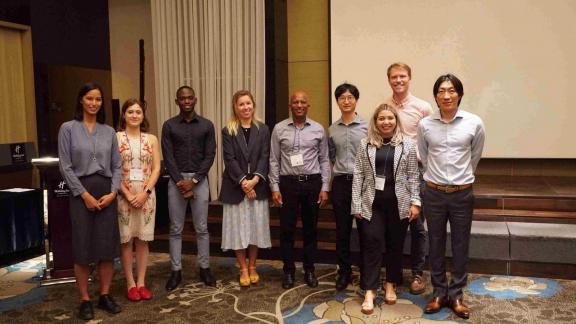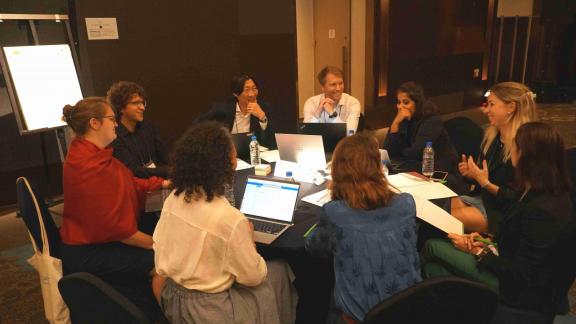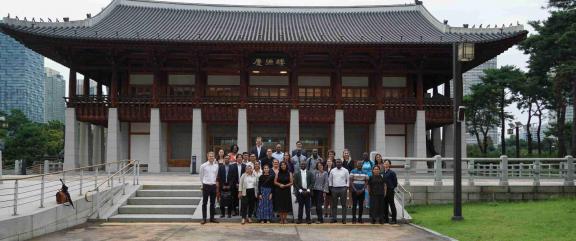Capacity-building for impact evaluation – LORTA Impact Evaluation Design Workshop
#ImpactEvaluation #KnowledgeExchange #GreenPartnership #RealTimeEngagment
As a member of the LORTA team, I helped organize this IE design workshop and would like to reflect on the experience in this blog. The resumption of in-person workshops after 3 years of running activities completely virtually was truly exciting, and I supported the LORTA team with the entire preparatory and planning work for this in-person IE design workshop. My work ranged from drafting and distributing invitations, developing and finalising the workshop agenda, to liaising with the GCF Secretariat and Korean embassies to provide visa support for the participants. I had the privilege of working and communicating closely with those selected to participate in this workshop, which included representatives of four GCF AEs: the Food and Agriculture Organization of the United Nations in Benin and in Cambodia (FAO), Caribbean Community Climate Change Centre (CCCCC), Japan International Cooperation Agency (JICA), and CRDB Bank Plc.
Five project teams participated in the LORTA In-person workshop this year (pictured above).
The in-person design workshop covered the importance of rigorous IE and what IE entails, including the required analyses and reporting. Throughout the four-day workshop, the participants were introduced to and discussed various topics such as experimental and quasi-experimental evaluation designs, the use of spatial data and geospatial IE design, power calculation, and the importance of constant coordination and collaboration between the evaluation and project teams.
Did the workshop change and influence the participants’ initial thoughts about IEs? Certainly! As the organizer, I was proud that this workshop contributed to addressing the participants’ various questions and concerns around the idea of conducting an impact evaluation. In fact, the participants left Korea motivated and determined to conduct an impact assessment for their GCF-funded project activities. In their own words, the participants acknowledged the value of the workshop and the learning that it had offered them, as the following:
- “A good impact evaluation is fundamental for effective outcomes and impacts.”
- “It helped me become more aware of the importance of and the need to start thinking about the impact evaluation earlier in the project initiation.”
- “The implementation of impact assessment should occur at the project development level, and funds for it should be included in the overall project budget.”
- “The workshop has reinforced my thinking that an impact evaluation should be mandatory.”
The author (fourth from the right) posing with workshop participants.
How was the workshop able to influence the participants’ thinking effectively? For one thing, the workshop enabled real-time active engagement and exchange of progressive ideas among the participants and the impact evaluation specialists. The multiple breakout discussion sessions taking place after each plenary session were not just an extension of the plenary sessions, but they provided a truly interactive space where both evaluation specialists and participants exchanged their past experiences, concerns, and ideas about how to better manage their GCF projects and conduct impact evaluations for them. This dynamic exchange of knowledge and experiences allowed participants to gain practical insights and perspectives they could apply to their projects with respect to their circumstances, ultimately enhancing their ability to think critically and strategically about the IE process.
Over the course of the workshop, the participants became more familiarized with and understood what impact evaluation encompassed and put much effort into making significant changes to their original IE designs. As a result of the workshop discussions and exchanges, their theory of change now included SMART (specific, measurable, achievable, relevant, and time-bound) indicators with clear causal links and assumptions, and key evaluation questions. Furthermore, the types of data that are needed to answer those questions were clearly identified. Their IE design methodologies were also selected based on available options and constraints such as implementation schedule, sample size, and available data. The budget utilization and acquisition plans for their projects were well formulated, as a result of the workshop outcomes.
In the following weeks, the LORTA team will engage with the GCF Secretariat and onboard some of the GCF projects that were represented in this IE design workshop to the LORTA portfolio. The onboarding of these GCF projects will be based on a set of strategic criteria and guiding principles, such as the feasibility of their IE design, budget implications, and the level of commitment by the project teams.
You can learn more about the LORTA programme here.
Disclaimer: The views expressed in blogs are the author's own and do not necessarily reflect the views of the Independent Evaluation Unit of the Green Climate Fund.


